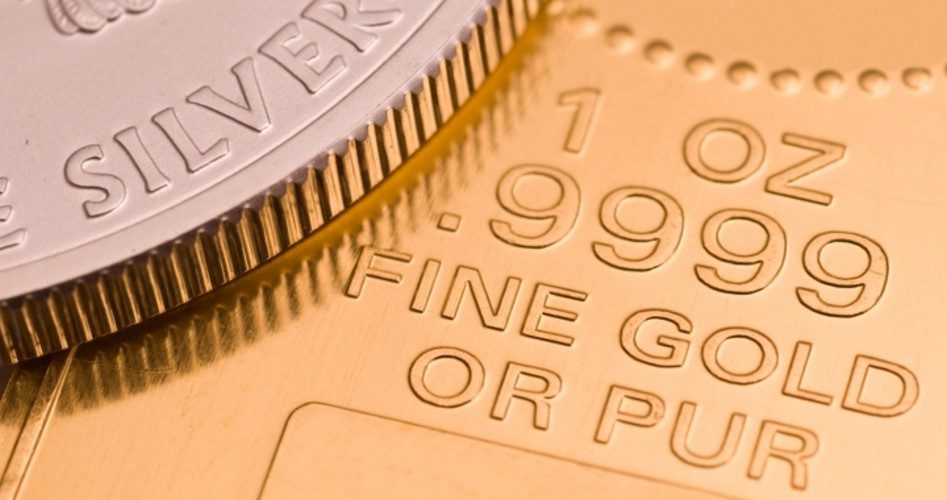
Another step toward the reestablishment of sound Constitutional money was taken on Wednesday in Kansas with the introduction of a bill (H.B. 2093) by the House Committee on Taxation exempting gold, silver, and other precious metals from sales taxes. It joins an increasing number of states exercising their sovereignty in such matters, ultimately exposing the fraud of Federal Reserve Notes (FRNs) posing as money.
As Mike Maharrey wrote in the Tenth Amendment Center blog: “By removing the sales tax on the exchange of gold and silver, Kansas would treat specie [gold and silver coins] as money instead of a commodity. This represents [another] small step toward reestablishing gold and silver as legal tender and [more importantly] breaking down the Fed’s monopoly on money.”
He added that the bill, if it becomes law, would allow citizens, if they choose, to pay bills and make other exchanges in gold and silver instead of paper or digital money issued by the Federal Reserve. More importantly, it invites contracts to demand payment in specie, thus largely eliminating the loss of value of paper money owing to inflation — increasing the money supply — by the Fed. Said Maharrey: “This would mark an important step toward currency competition. If sound money gains a foothold in the marketplace against Federal Reserve Notes, people will be able to choose the time-tested stability of gold and silver over the central bank’s [the Fed’s] rapidly-depreciating paper currency.”
How rapid is that depreciation? At the moment, the Fed admits to price increases — which it incorrectly calls inflation — of two percent a year. If nothing changes, that would cut the present purchasing power of a single FRN in half in 36 years.
But a better calculation would go back to 1914 with the beginning of the operation of the country’s unconstitutional central bank, when an ounce of gold was worth $20.72. Today, as the purchasing power of the dollar has diminished, an ounce of gold, reflecting that destruction, trades at a little over $1,300 an ounce. Put another way, a dollar today buys what a little over a penny bought in 1914.
As reported by The New American last month, three bills were offered for consideration by the Wyoming legislature requiring the state’s treasurer to invest 10 percent of each of the state’s trust funds in precious metals. This builds on the state’s previous decision to allow its citizens to use gold and silver coins “as tender in payment of debt,” just as the Constitution demands in Article I, Section 10.
And just last week we reported that Tennessee legislators offered a bill to make gold and silver coins legal tender there as well. Similar bills have been filed in Arizona and West Virginia.
Ron Paul, in a statement published by the Ron Paul Institute for Peace and Prosperity, praised Arizona’s bill for “ensuring that people are not punished by the taxman for rejecting Federal Reserve Notes in favor of gold or silver. Since inflation increases the value of precious metals, these taxes give the government one more way to profit from the Federal Reserve’s currency debasement.… It is imperative that [this] law protect people’s right to use alternatives to what may soon be virtually worthless Federal Reserve Notes.”
Oklahoma repealed its sales tax on gold and silver in 2014 but still assesses capital gains taxes on precious metals. That would be repealed by a bill pending in the state senate. Arizona has moved ahead as well by first removing the sales tax on transactions conducted using gold and silver coins, and then by considering a bill requiring the state’s treasurer to hold 10 percent of the state’s $500 million Budget Stabilization Fund in precious metals.
Give citizens the option and many will take it. Over time, restoration of sound constitutional money will replace FRNs. Historians will likely refer to America’s experiment with paper and digital FRNs backed by nothing as a grievous and massive fraud, just like the phrase “not worth a Continental” refers to the country’s initial experiment of paying its bills with paper that rapidly became worthless. Similarly, calling Venezuela’s worthless currency the “strong bolivar” is now considered a sick joke.
An Ivy League graduate and former investment advisor, Bob is a regular contributor to The New American magazine and blogs frequently at LightFromTheRight.com, primarily on economics and politics. He can be reached at [email protected].
Related articles:
Tennessee Considering Bills Restoring Gold and Silver as Sound Money
Wyoming Bills Would Require State’s Trust Funds to Hold “Monetary Metals”




